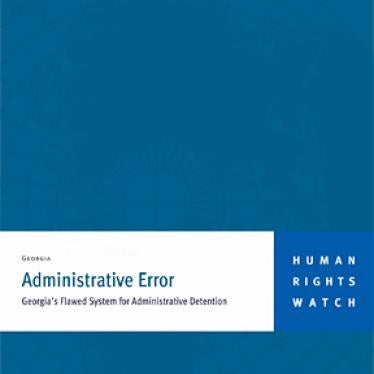(Tbilisi) – Georgia’s system for handling administrative offenses, or misdemeanors, violates the defendant’s due process rights, Human Rights Watch said in a report released today. The Georgian government is reforming the system, but should take urgent measures to ensure defendants’ rights.
The 41-page report, “Administrative Error: Georgia’s Flawed System for Administrative Detention,” documents how Georgia’s Code of Administrative Offenses, which governs misdemeanors, lacks full due process and fair trial rights for those accused of offenses under the code. The code, adopted in 1984, provides for prison sentences of up to 90 days for violations, but does not require police to inform defendants of their rights promptly or to provide reasons for their detention. Detainees often are not allowed to contact their families. Lawyers have difficulty finding detainees in custody. Trials are often perfunctory. Detainees often serve their sentences in facilities that were not intended for stays longer than 72 hours and where conditions do not meet international standards.
“People who are arrested shouldn’t have to wait for a reform process to be finished to have their basic rights respected,” said Giorgi Gogia, senior Europe and Central Asia researcher at Human Rights Watchand author of the report. “It is encouraging that the authorities are reforming the outdated code, but more urgent steps are needed to address the gaps in the law.”
Georgian authorities have used the Code of Administrative Offenses in recent years to lock up protesters and activists at times of political tensions, Human Rights Watch said.
In 2011 Georgian authorities drafted a new Code of Administrative Offenses, but the version that passed the first hearing in Georgia’s parliament in July still does not meet the country’s human rights obligations, Human Rights Watch said. The government should take immediate steps to bring all detainees’ fair trial rights into compliance with its human rights obligations by ensuring that anyone taken into custody for an alleged administrative offense is allowed to notify a third party, can choose and notify a lawyer, and is tried under fair trial norms, Human Rights Watch said.
The report is based on interviews with lawyers who have defended dozens of administrative detainees, six people who served administrative prison sentences, two people fined by the courts for administrative violations, and senior government officials. Nearly all of those interviewed who had been charged with administrative violations had been detained in relation to opposition political protests.
In Georgia’s justice system administrative offenses, or misdemeanors, are minor public order breaches that do not accrue a criminal record. Under international law, the 90-day maximum imprisonment sentence for certain administrative offenses amounts to a criminal penalty, though. According to Ministry of Interior statistics, in 2011 alone courts sentenced 31 people to 90 days in prison on administrative charges, 132 people to 60 days and 343 people to 30 days.
But the protections in Georgia’s Code of Administrative Offenses on such basic issues as informing the person of the reason for the arrest or allowing the person to notify family members are either weaker or vaguer than similar safeguards in Georgia’s Criminal Procedure Code, Human Rights Watch found.
Nor do individuals facing charges under the administrative code have due process protections in court. In the cases examined by Human Rights Watch, trials rarely lasted more than 15 minutes, and judicial decisions relied almost exclusively on police testimony. In cases in which the accused was able to retain a lawyer, they lacked time to prepare an effective defense. In two cases documented by Human Rights Watch, the defendants had visible injuries in court, which went unquestioned by judges. In addition, all lawyers interviewed by Human Rights Watch spoke of obstacles in exercising the right to appeal, effectively rendering it meaningless.
Because the potential punishment for administrative offenses amounts to a criminal penalty, anyone facing administrative charges should have the same rights to due process, fair trial norms, and protections against arbitrary detention that people do when they are charged under the criminal code, Human Rights Watch said.
The European Court of Human Rights has in past years ruled that states with a system of administrative detention have an obligation to provide adequate due process and fair trial protections in order to meet the standards required by the European Convention of Human Rights.
“It’s in Georgia’s own interests to address the administrative offenses code now,” Gogia said. “If it doesn’t, there could potentially be European Court judgments finding Georgia in violation of the European Convention.”
Detention conditions are also a problem, Human Rights Watch said. Detainees serve their sentences in temporary detention isolators (TDIs) under Interior Ministry jurisdiction. These facilities are mainly used to hold detainees on criminal charges for up to 72 hours before they are charged and transferred to a pretrial detention facility, and were not intended for longer-term occupancy.
The authorities have made significant efforts in recent years to renovate the temporary detention isolators, but more steps are needed to meet basic international standards, including access to a daily shower or outdoor exercise, Human Rights Watch said.
Reports by the European Committee for the Prevention of Torture and the Georgian Ombudsman’s Office, as well as corroborating testimonies of former detainees, indicate that the detention conditions at these facilities often fall short of international standards.
“The Georgian government should bring the administrative offense code into line with international standards,” Gogia said. “And in the meantime, it should ensure basic rights for anyone arrested for a misdemeanor offense.”







